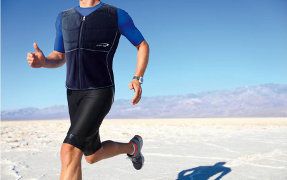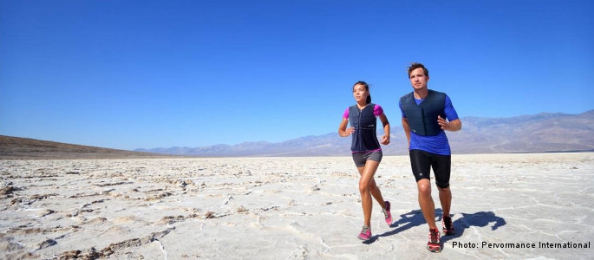Improve Quality of Work and Life Despite the Heat
E.COOLINE protects workers from heat, improves quality of life for people, and even enhances performance in sports. The need for active heat protection is growing because forecasts predict more heat waves because of climate change. This not only affects the environment but also millions of people around the world who suffer from heat at work, while playing sports, and in their daily lives.
In 2008 the report of the German national workers association (BauA) showed that 10 percent of the working population suffers from heat. Most of the questions addressed to the association were about solutions for climate problems. In the heat wave of 2003, more than 35,000 people died and many people had severe problems with their health.
From a medical point of view, this is not surprising. Human beings have a core body temperature of 37 °C (98.6 °F), whereby all processes of the body run perfectly. With 38 °C (100.4 °F), the problems occur: People do not feel well anymore, they lose concentration, and performance deteriorates. With 39 °C (102.2 °F), people suffer from fevers. More than 40 °C (104.4 °F) and lives are endangered.
Furthermore, people with higher core body temperatures – even if only sweating – have much higher pulse rates. High temperatures represent a high risk factor for developing cardiac disease. Older people and people who suffer more from heat because of their extreme working conditions are affected by cardiac problems.
With hot temperatures, the productivity of people – and therefore the productivity of companies – is also affected. The Kiel Institute for the World Economy reports that 12 percent of productivity is lost on hot days, meaning climate change is also responsible for economic losses.
The performance of sports players declines in heat. There is discussion on whether the FIFA World Cup can be held in Qatar in 2022 because of the heat – everybody knows that playing sports in the heat creates problems.
Knowing this, many people, states, and companies install air conditioning systems to reduce temperatures – mostly in buildings. The problem is that air conditioning systems need lots of energy. According to scientific explanations on the reasons for climate change, this means that CO2 production increases dramatically, which leads to a vicious cycle. Consequently, the world beats the heat with larger emission amounts, which leads to more dramatic negative impacts on the environment.
To stop this disastrous development, new and innovative cooling systems are required. One innovative possibility for cooling human beings in hot conditions is cooling apparel – leading to more effectiveness and lower energy consumption. By using cooling apparel instead of air conditioning systems, there are fewer greenhouse gases emissions.
Cooling apparel is not only climate-friendly but highly effective. It works on the natural physical principle of evaporation of water and uses the high temperatures in the surroundings to cool the body. The reduction of heat on the skin can be up to 12 °C, which makes life and work much more comfortable. In studies of patients suffering from heat stress, even the core body temperature was reduced by up to 1 °C. In a study by the University of Munster, it was discovered that people playing sports in 30 °C weather improved their performance up to 10 percent using cooling vests. This means cooling apparel is highly effective and represents a big breakthrough in fighting heat.
The marginal volume of tap water that is needed to activate the product means it is highly ecological. With climate-neutral production, pervormance international GmbH, a participant in the UN Global Compact, is closing the circle when it comes to sustainability and climate protection.

E.COOLINE is now operating a climateneutral production and business. This means E.COOLINE is taking on a pioneering role, not only in the marketing of cooling apparel but also in the textile industry. In collaboration with the consultancy ClimatePartner, the carbon emissions have been calculated for all
work, sports, and medicine apparel and compensated through a certified carbonoffset project. Based on this information, detailed carbon footprints of products were computed for all E.COOLINE models, including cooling vests, T-shirts, and cooling headgear.
The calculations include all carbon emissions produced throughout the products’ supply chain as well as the car park, the building, and everything from sourcing raw materials to processing, production, and transportation, including marketing and sales. pervormance international GmbH is using this to identify the largest emission-drivers and implement reduction measures in the interest of optimizing processes even further. To attain a climate-neutral business, E.COOLINE fully compensates for the emissions released
using a carbon-offset project for reforestation conservation in Mozambique. In addition to promoting reforestation, this also improves local social conditions and protects existing forest areas.
Furthermore, the COOLINE® SX3-Technology is “Made in Germany.” There are no production facilities in countries where human rights are violated. The brand E.COOLINE from pervormance international GmbH respects the principle of women’s empowerment and more than 50 percent of its employees are women.
Improving the lives of workers in hot conditions further supports these principles.
pervormance international GmbH, with its E.COOLINE product range, shows that it is possible to improve quality of life and work for people; reduce greenhouse gases; realize the vision to be an architect of a better world with innovative ideas; and to have innovative technological and sustainable values.
| Initiator | Pervormance International |
| Project start | 2002 |
| Status | active |
| Region | Germany, Europe |
| Contact person | Gabriele Renner |
| Awards | - |
| Anti-Corruption | - |
| Business & Peace | - |
| Development | - |
| Environment | - |
| Financial Markets | - |
| Implementing UNGC Principles in your Corporate CSR Managemen | - |
| Human Rights | x |
| Labour Standards | x |
| Local Networks | - |
| Advocacy of global issues | X |
| Business opportunities in low income communities/countries | - |
| Project funding | - |
| Provision of goods | - |
| Provision of services/personal | x |
| Standards and guidelines development | X |
Write a comment about this page
Your comments are provided by your own free will and you take sole responsibility for any direct or indirect liability. In order to maintain the highest discussion quality, all comments will be reviewed by our editors. You hereby provide us with an irrevocable, unlimited, and global license for no consideration to use, reuse, delete or publish comments in accordance with our Community Guidelines.
About Us // Privacy Policy // Copyright Information // Legal Disclaimer // Contact
Copyright © 2012-2018 macondo publishing GmbH. All rights reserved.
The CSR Academy is an independent learning platform of the macondo publishing group.









